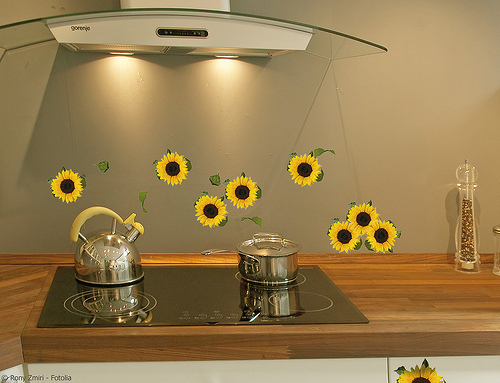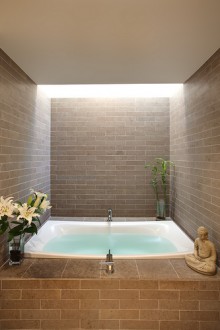Theme Essay by Sarah Domet
Real Lessons in House Hunting—from Reality TV
There’s something so addictive about House & Garden TV’s House Hunters—and its spinoff House Hunters International—that on any given night I’m likely to watch a string of episodes, time wrinkling and disappearing into the foyer of a villa on Italy’s Amalfi Coast.
The original series premiered in 1999, but I didn’t discover the show until ten years into its run, around the same time the U.S. housing market began its slow descent toward crisis. HGTV’s website for House Hunters claims it’s about the “emotional experience” of purchasing a new home, as it documents potential buyers’ decisions about “whether or not a home is meant for them.”
To me, House Hunters points to how we got into this housing mess in the first place, regardless of who is to blame. We’ve been told that we all deserve homes, and those houses have become artificial projections of ourselves, with ownership of the ideal home as the ultimate measure of success.
And what if you can’t afford to buy a house? The show makes it clear that the intended audience does not live in an inner-city housing project or even a working-class neighborhood. The website includes “Pick Your Fave” surveys and other viewer features that convey House Hunters’ tone. For example:
Play House Wars: French Country, Craftsman, Federal or Cape Cod—which home style would you choose? Select your dream home then check out the home plans.
The good people at HGTV even provide a handy link so you can purchase blueprints—for upwards of $1,500.
I’m amazed that a reality TV series with obvious class biases continues to offer me such a voyeuristic thrill as I sit on my couch noshing pita chips.
The formulaic setup never wavers: Interested buyers (usually a couple) are shown three places within their budget. Will they select house number one, two, or three? After plenty of poking around and a good amount of dramatic soul searching—all punctuated with earnest interviews and plenty of commercial breaks brought to you by Lowes—the couple reveal their selection and sign some official-looking papers.
In the last moments of the show, we flash forward a few months to see them enjoying their new digs. Cue closing credits. Begin happily ever after.
Since I’m sure I’m not the only viewer for whom a country house in Provence is way out of reach, the appeal has to go deeper than “I could buy that.” As with nearly all reality TV shows, House Hunters is also about human psychology. The promotion for the show prods the viewer, “Come on, you know you want to look,” and they’re right. House Hunters allows us to peer beyond the usual social boundaries to watch couples communicate, quibble, blithely ignore each other’s needs—or, occasionally, love each other enough to find the right choice for both of them.
And then there’s the delicious part of being a voyeur, where you get to judge the bad choices, to wonder and revel in the weirdness of other human beings. Because I’m the kind of person who likes to justify guilty pleasures, I’ll go so far as to say I’ve learned three useful lessons from this reality series—although they aren’t the ones HGTV would trumpet.
Lesson One: Everyone Has Worse Taste than You Do
When searching for a home, act disgusted. Point out the flaws. Criticize. Judge. Sneer. It’s okay to be snarky. It’s what you’re supposed to do. (A director’s voiceover is appropriate here: “You’re on TELEVISION, people. Lights, camera…critique!”)
“The chandelier looks like a huge moose hanging from the dining room ceiling,” says Amy in a recent episode about former Chicagoans returning to St. Louis to be close to family (“Making It Right in St. Louis,” originally aired April 25, 2010). Moments later, her husband Josh notes that the pink-painted bedroom looks like “Barbie vomited all over the walls. Perfect.” As they stroll through the three homes in a latte-in-hand-casual kind of way, they declare at every turn how awful the decor is, how horrific the floor plan feels, or how this or that room would need—scoff, scoff—“total gutting.”
These criticisms aren’t aimed at the house itself. They’re intended for the seller—who, of course, is not present as the house hunters pass open judgment. But we all love to pass judgment, don’t we? For anyone who’s ever gone to a house showing, this is part of the thrill. Everyone has worse taste than we do—but how often do we really get to say so?
A few years ago, my parents sold the home where I grew up, and many of the neighbors stopped by just to look inside. I cringe as I think of those nosy folks tromping through our family room. But aren’t I doing the same thing every time I watch another episode of House Hunters? Judging is a guilty pleasure.
Lesson Two: You Deserve More
For some people, house hunting demonstrates that ego has no bounds. (A big ego requires a big budget, too, FYI.) In a recent episode of House Hunters International, Moran, an early-career diva, eagerly anticipates her move to the world of posh digs (“Fashion Divas Take on the Apartment Scene in Downtown Tel Aviv,” originally aired July 11, 2011). She vapidly observes, “I’m really excited to be here and go out with everybody and party.” At the ripe young age of twenty-four, she’s ready to “Start Tel Avivin’.”
Whatever “Tel Avivin’” is, it apparently requires large sums of money. By her own admission, Moran has very “specific tastes” that must be met. She’s already hired designers to help her create “the kind of comfort level” to which she’s accustomed.
Moran embodies what I call The Diva Conundrum. Money is beneath her, yet she’s greedy for all things urban chic. Her older sister fears that Moran might have a budget meltdown. When she explains to Little Diva Sis that one of the three properties would be a substantially better investment and could be sold for double or triple the value in a few years, Moran shrugs, saying, “I want to live the way I want to live.” So there.
Watching House Hunters over the years, I’ve noticed that people tend to want things for the sake of wanting—because they think they should want them. Hardwood floors make us feel good about ourselves; stainless steel shows we’re in control; granite countertops provide a healthy dose of confidence. We deserve it. (And if daddy back in Canada has provided a healthy $650,000 budget, as was the case for our Tel Avivin’ gal, all the better.)
Lesson Three: Let the Bathtub Go
Perfectionism is the enemy of the house hunter.
Allow me a brief sidetrack: In Hawthorne’s short story “The Birthmark,” Aylmer, a scientist, becomes obsessed with the hand-shaped birthmark on the face of his otherwise flawless wife. In the end, Aylmer’s tonic to remove the birthmark ultimately kills the poor woman.
I couldn’t help thinking of Aylmer when I was introduced to Brent and Natalie, a young couple moving from Australia to the bustling harbor city of Hong Kong (“Modern Apartments in Hong Kong,” originally aired March 11, 2011). Natalie has given up her broadcast reporter career to relocate with Brent, and she makes her wishes known up front: “I absolutely refuse to live in a place without a bathtub.”
However, Hong Kong, a world center of laissez-faire capitalism, doesn’t appear to be a city rich in tubs. When the couple visits the first of three apartments, Natalie looks past the bright and airy space and the garden (a quite uncommon jewel in this crowded city, we’re informed), instead focusing on the lack of a bathtub. “This will be bad,” she mutters.
The story of Brent and Natalie—exploring their new city, taking in high-rises and ultramodern spaces that would be the envy of any hipster’s dream—becomes the story of a couple navigating the delicate push-pull of their relationship.
Unlike Aylmer, Natalie gradually learns to let go of her obsession. “The bathtub thing, I think, is just not going to happen here,” she says, recognizing that the home they’ll choose—the one within their budget and closer to Brent’s work—leaves her without a place to soak. Through the process of house hunting, she realizes if she was willing to sacrifice her job to be with the man she loves, maybe she can concede some smaller points, too.
What happens when you let go of the thing you think you want the most? You often find something you want even more.
Natalie realizes what so many of us don’t: At the end of the day, exteriors can only do so much to protect what lies within. Homes and all their trappings can’t dispel the quirks and idiosyncrasies of their residents. Once you close the door on the world outside, can you live with the people inside?
Art Information
- House Hunters publicity photo of Suzanne Whang © HGTV
- "Plage Coleccion Nature DECO" © Plage Vinilos y Adhesivos; Creative Commons license
- "Bath" © Jonathan H. Jackson; Creative Commons license
Sarah Domet is the author of 90 Days to Your Novel. She currently teaches in the writing department at Georgia Southern University. This summer, when not writing or teaching, Sarah planned to read plenty of guilty (and non-guilty) pleasure books while at the beach and to visit local farmers’ markets where she’d buy (and consume) copious amounts of fresh figs, canary melons, and fresh boiled peanuts. Work on the very difficult art of relaxation continues....




